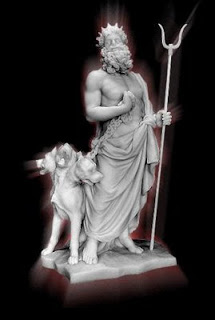More History Topics
More Topic Categories
Related Destinations
Greek Underworld
 The Greek underworld is also known as Pluto and Hades, two words that were also used to describe the anthropomorphic power that governed this place.
The Greek underworld is also known as Pluto and Hades, two words that were also used to describe the anthropomorphic power that governed this place.To enter the underworld, the dead would cross the Acheron River on the boat of Charon (Death), who charged one “ovolos” for his service. The “ovolos”, a coin of small value, was placed under the tongue of the deceased by the relatives. The poor and those without relatives or friends were doomed to wait forever on the bank of the river. The opposite bank was guarded by Cerberus, a three – headed dog that was killed by Hercules. The five rivers of Hades were Acheron (the river of sorrow), Coccytos (the river of wails), Phlegethon (the fiery river), Lethe (the river of oblivion) and Styx (the river of hatred).
The underworld consisted of various areas. The first place when human souls entered the underworld was Erebus, which, according to Homer, is also the place where the Titans Menoetius and Epimetheas were banished when Zeus defeated them. According to another version, that of Hesiod, Erebus was the darkest place of Hades, the place where the thrones of Pluto and Persephone were located, along with the cave of Scylla.
Another location in the Greek underworld was Tartarus, where the souls of evil men were tortured in eternity. Homer, in his works, describes a number of criminals being tortured in Tartarus, such as Tityon, Tantalus and Sisyphus. According to Hesiod, Tartarus is the gaol of Cronus and other Titans. Aristophanes describes Tartarus as the torture place for specific crimes, mainly patricides, oath breakers, traitors and those who violated the asylum of hospitality.
A completely different area of the underworld was the Elysian Fields, the final resting place of the souls of heroes and virtuous people. It was a paradise full of blooming fields, a place of eternal Spring, where the springs of Lethe would offer nectar that made the dead forget all misery and troubles they were found on Earth. According to the myth, Menelaus and Helen were placed there, where they would ride horses, play games and music.
See Also:
 Athens Photos
Athens Photos
 Santorini Photos
Santorini Photos
 Crete Photos
Crete Photos
 Meteora Photos
Meteora Photos
 Corfu Photos
Corfu Photos




